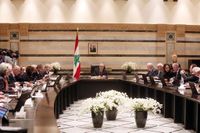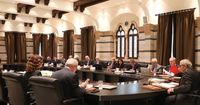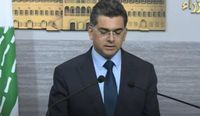Lebanon's government is gearing up for a significant overhaul of its banking sector, with discussions set to continue in a crucial session on April 13, 2025. Following a third day of deliberations, the Council of Ministers has been working on a draft law aimed at restructuring and reorganizing banks, a move seen as essential for stabilizing the country’s financial system.
During the session held on April 12, Finance Minister Yassin Jaber emphasized the urgency of finalizing the draft law before his upcoming meetings with the International Monetary Fund (IMF). Jaber intends to present the government's approval of the necessary conditions set by international bodies to the IMF, which is crucial for any potential agreement between Lebanon and the financial institution.
"We need to show the IMF that we are committed to reforming our banking sector," Jaber stated, highlighting the importance of this legislative effort in the context of Lebanon's ongoing economic crisis.
The discussions have already seen amendments to some of the 13 items proposed by the Association of Banks, reflecting the government's responsiveness to the concerns of major banking institutions. However, the complete draft law will not be finalized until the third session, indicating the complexity of the issues at hand.
Despite the focus on banking reforms, the government also addressed pressing social issues during the session. Following a strike by teachers, the government approved new compensation measures aimed at improving their financial situation. Teachers will receive two additional ranks, which will be integrated into their basic salaries, effective from February 1, 2025. This decision comes after teachers expressed dissatisfaction with their pay and working conditions.
In addition to the pay increase, a monthly allowance will be granted to employees in the Ministry of Education and Higher Education, amounting to approximately 13 times their basic salary. The decree aims to support the educational workforce, which has faced financial challenges due to the broader economic downturn.
"We recognize the hard work of our teachers, and it is imperative that we support them during these tough times," Jaber remarked, underscoring the government's commitment to education.
The government has also addressed the situation of contractors in the education sector. Starting from the 2024-2025 academic year, contracted teachers will receive a fixed compensation based on their hourly wage, which is expected to significantly increase their earnings. This measure aims to ensure that all educators, regardless of their employment status, receive fair compensation for their work.
As the government prepares for its next session, attention is also turning to the private sector. A meeting of the Expanded Committee, chaired by Labor Minister Muhammad Haidar, is scheduled to discuss the salaries and wages of private sector workers. The committee aims to raise the minimum wage and increase family allowances, with results expected to be announced by the end of April 2025.
"We are committed to ensuring that all workers in Lebanon receive a fair wage that reflects the current economic realities," Haidar stated.
The government's proactive approach to addressing both banking reforms and social issues reflects an understanding of the interconnectedness of economic stability and social welfare. As Lebanon faces mounting pressures from both domestic and international fronts, the outcomes of these sessions will be closely monitored by various stakeholders.
In summary, the coming days will be critical for Lebanon as the government works to finalize its banking reform legislation while simultaneously addressing the needs of its educators and private sector workers. The decisions made in these sessions will have lasting implications for the country's economic recovery and social cohesion.



